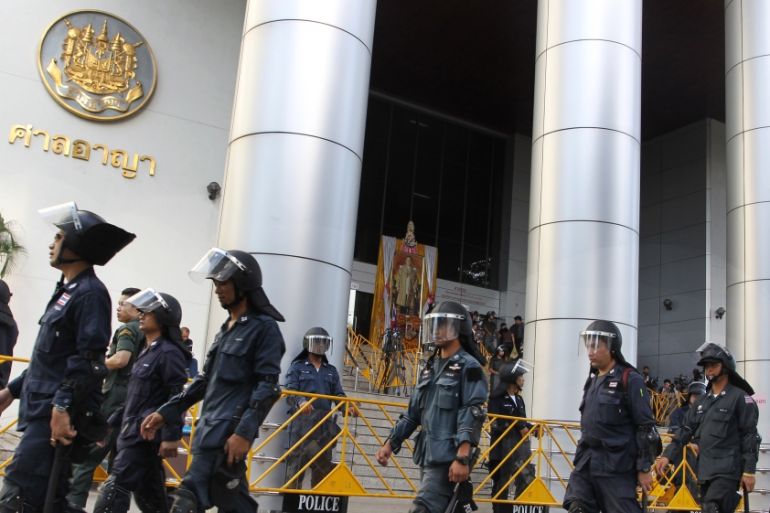Thai lawyer Arnon Nampa faces 150 years in jail for royal insult
Prominent human rights lawyer is charged with 10 counts of royal defamation for Facebook posts.

A prominent Thai human rights lawyer faces a prison term of up to 150 years if convicted of royal defamation under Thailand’s royal insult law, according to a legal watchdog.
Arnon Nampa, of Thai Lawyers for Human Rights, said on Thursday that Prawet Prapanukul was charged on Wednesday by the Bangkok Criminal Court with 10 counts of lese majeste (the insulting of a monarch or other ruler) for Facebook posts, each punishable by up to 15 years imprisonment, and three counts under the Computer Crime Act, each with a seven-year maximum sentence.
Keep reading
list of 4 itemsKey takeaways as Cohen faces more questioning on day 17 of Trump’s trial
Michael Cohen resumes testimony in Trump hush-money trial
Key takeaways as ex-Trump lawyer Michael Cohen testifies in New York trial
|
|
“But Thai laws only allow a maximum of 50 years in prison for all the charges combined,” said Arnon.
“I personally don’t think [Prawet’s] posts violate the lese majeste law because he only criticised the law, not the monarchy.”
It was not clear what exactly Prawet, 57, wrote on Facebook, but the AFP news agency said in one of the recent posts he encouraged Thais to push the boundaries of the lese majeste law.
Prawet was detained after a raid on his home by police and troops on April 29, a day after his last Facebook post.
He is in pre-trial detention at a Bangkok remand prison after being held incommunicado at the 11th Army Circle base in Bangkok, a facility the military uses as a temporary prison.
The group Human Rights Watch urged the military to observe due process.
“Even though lese majeste is a serious criminal offense in Thailand, authorities have no justification to breach due process and fair trial standards,” Sunai Phasuk, Thailand researcher at Human Rights Watch, told the Reuters news agency.
“The military regime has aggressively used lese majeste charges to clamp down on any speech and opinion they find objectionable.”
Five others charged
The Bangkok Criminal Court on Wednesday also charged five other people, who asked not to be identified, with defaming the monarchy for sharing Facebook posts written by a Paris-based Thai historian Somsak Jeamteerasakul about the disappearance of a democracy plaque in Bangkok last month.
“They shared Somsak’s posts about the 1932 plaque,” Arnon told AFP without elaborating on what the posts said.
The small bronze monument, which lay in Bangkok’s heavily-policed Royal Plaza, marked the 1932 revolution that ended absolute monarchy in Thailand.
READ MORE – From love to fear: The rise of King Vajiralongkorn
It was mysteriously replaced by a new plaque bearing a royalist message in April, sparking fury among Thailand’s hard-pressed democracy campaigners who fear the monument was removed with official backing.
Authorities have moved to stifle discourse on the missing plaque and have detained several activists who have tried to call for an investigation.
Thai authorities last month warned that contacting, following or sharing social media posts by Somsak could be grounds for legal action.
Thailand’s military seized power from an elected civilian government in a May 2014 coup.
Since then, it has detained hundreds of politicians, activists, journalists and others accused of being involved in anti-military protests and activities.
|
|